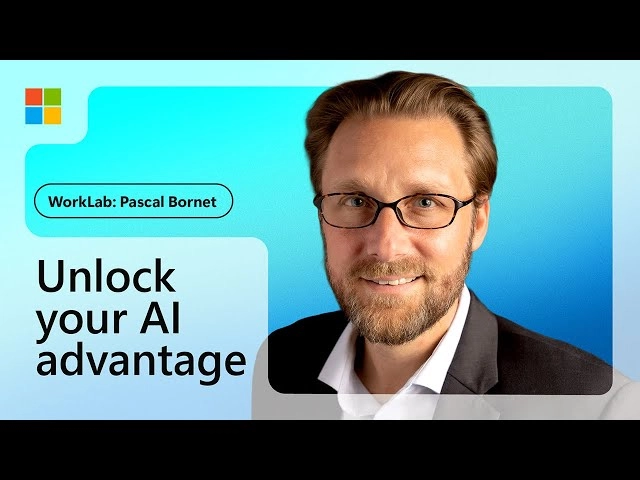As AI expert Pascal Bornet explains, the future of the economy depends not only on the use of advanced artificial intelligence, but on a profound transformation that puts people at the center. Bornet puts it succinctly: “The companies that are successful are only those that put people at the center of their transformation.” This philosophy underlies the emergence of agentic artificial intelligence, a paradigm shift that will redefine work and competitive advantage.
During a recent discussion on Microsoft's WorkLab podcast with host Molly Wood, Bornet, author and globally recognized authority on AI and intelligent automation, shared insights from over two decades of experience implementing these technologies at companies like McKinsey and EY. The conversation focused on the evolution from traditional automation to advanced AI agents and highlighted how companies can strategically use these tools to empower their workforce and strengthen their competitive advantage.
Bornet traces the lineage of intelligent automation from early robotic process automation (RPA) and script automation, which he calls “an old breed of agents” designed to perform autonomous, predefined actions for humans. The recent explosion of generative AI, exemplified by large language models (LLMs) like ChatGPT, brought a new level of intelligence. These models excel at understanding context, answering questions, being creative, and planning complex scenarios. But Bornet points out a crucial limitation: “They can’t do anything, they can only suggest things.” This gap between insightful information and actionable implementation creates significant “frustration” among users and highlights that “we have information, but we still need action.”
This is exactly where agent AI comes in. Unlike generative AI, which merely makes suggestions, AI agents are designed to “understand contexts, understand goals, plan actions, and learn from the results of those actions and improve over time.” Bornet outlines a “SPA” framework for these agents: they sense their surroundings, plan actions based on goals, act to implement those plans, and reflect on the results to learn and improve. This reflects human cognitive processes and goes beyond simple task automation to intelligent, adaptive execution.
The real-world applications of agent AI are already showing significant impact across various industries. Bornet cited Pets at Home, the UK's largest pet care company, which achieved 99% accuracy in transcribing veterinary consultations using an Ambient Digital Scribe. This agent not only records, but also performs transactional work, connects to patient data, and prepares necessary documentation, allowing veterinarians to focus on patient care. Other examples include fraud detection agents that detect patterns invisible to the human eye, insurance integration agents that verify insurance coverage in real time, and branch assistants that provide personalized guidance to employees. Additionally, Bornet cites examples such as JP Morgan, which reduced fraud by 70%, and McKinsey, which reduced customer onboarding lead times by 90% through intelligent automation. These diverse use cases underscore that the potential of agent AI is “unlimited” and applicable to “every function and every industry.”
At the heart of this revolution is the crucial role of humans. Bornet emphasizes that successful companies prioritize their employees and nurture what he calls “humics” – unique human skills that machines cannot fully replicate. This includes genuine creativity that produces truly original ideas rather than simply recombining existing ones; critical thinking, which involves nuanced judgment, questioning assumptions, and navigating complex ethical dilemmas; and social authenticity, building deep, trust-based relationships through empathy and shared awareness. AI can simulate these, but can never authentically recreate them.
Related Reading
For business leaders, the transition means becoming “orchestrators” of human-agent workflows. The focus shifts from assigning tasks to setting goals and setting boundaries for agents, allowing people to leverage their unique abilities. Leaders must invest in their employees and provide them with time and resources to develop these humics. This includes fostering a culture of experimentation where employees are empowered to try out new technologies, learn from mistakes and continually build new skills in collaboration with AI. This step-by-step, trust-building approach is critical.
The long-term competitive advantage lies in building “Compounding Intelligence Advantages”. Early adopters don't just reap temporary benefits; They create competitive advantage by generating data through agent interactions that continually improve their entire agent ecosystem. In a future where AI becomes commodified, companies that excel in the unique combination of human capabilities and agent systems will thrive. This requires a strategic vision from the top – C-levels and boards of directors need to understand how AI can transform their companies and not just automate existing processes. It's about reinventing, not just replicating.
